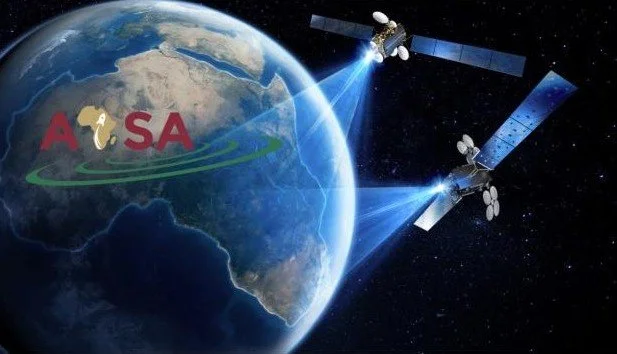The African Space Agency Takes Off… But Who Sets the Course?
Graphic by Faith Austin.
“Africa’s survival and prosperity depend on its ability to harness space technologies. Space is not a luxury. It is not about launching rockets for show….”
During a July 2025 address to the African Union (AU), the President of the Council of the African Space Agency, H.E. Dr. Tidiane Ouattara, expanded on his previous bold statement: “Space is the silent infrastructure behind food security, disaster response, climate resilience, smart agriculture, mineral management, and even electoral transparency.”
However, only a combined 65 of the over 10,000 total active satellites in Earth’s orbit belong to members of the AU. The Africa in Space consultancy firm reported that for the few hundred commercial space companies in the nearly two dozen space-faring African countries, such as South Africa and Egypt, progress and innovation are siloed without cooperation.
Dr. Outtara made it clear: “When speaking of African solutions to African problems, it is essential to invest in African satellites, designed by African engineers and launched under African policy frameworks.”
For most of modern history, since the early Cold War, the domain of outer space has only been accessible to and capitalized on by a limited number of nation-states that operate north of the Equator. African countries have needs that are specific to the equatorial region, and European and other satellite programs often do not cater to those needs.
Evident in how the United States aims to plant a flag on Mars, Russia chases to compete with Starlink, and China hopes to build a lunar base and nuclear power station by 2035, the dash for the podium in today’s “New Space Race” makes it important now more than ever before to prioritize an equitable approach to progress in the domain of African space technology.
The solution?
In April 2025, the African Space Agency (AfSA) was formally launched to align and coordinate space-based and capacity-building activities among the African Union’s 55 member states. In the past six months, the 10-member African Space Council (ASC), which oversees the AfSA, has signed numerous cooperation agreements with the European Space Agency, the United Arab Emirates Space Agency, and Russia’s Roscosmos. Most notably, the newly inaugurated organization entered the 100 million EUR program called the EU-Africa Space Partnership with the European Commission.
Despite the recent influx of these seemingly novel international partnerships for the young agency, its relationship with China began long before this year.
Since the early 2000s, the Chinese Communist Party (CCP) and Chinese private companies have invested heavily in Africa’s entry into the space industry. Based in Cairo, Egypt, AfSA’s new building and technical infrastructure were wholly built by China, who in return “gets control over Africa” and their space-based decisions, says expert Thomas Weissenberg.
According to Reuters, China is leaning into forging alliances across Africa through its space program as the United States cuts foreign aid and withdraws its engagement with the continent. Beijing has reportedly signed 23 space agreements with AfSC nations, investing in satellites, ground stations, and research infrastructure, which provides the CCP with long-term surveillance and debt control capabilities.
The AfSA stands at a crossroads. It can either replicate the extractive patterns of the past—where outside powers build the infrastructure, finance it on their terms, and reap the strategic benefits—or it can chart a sovereign course that anchors Africa’s space future in African hands. Global equity demands the latter.
With the space economy set to reach $1.8 trillion by 2035, the question is not whether Africa will participate, but whether it will do so on its own terms. By turning external competition into leverage and centering capacity-building across the continent, the AfSA can transform space from a silent infrastructure of dependency into a foundation of independence.
Africa’s future in space will either mirror the inequities of the past—or redefine what global equity looks like beyond Earth’s atmosphere.

